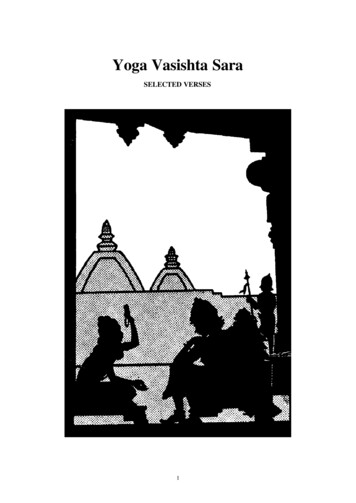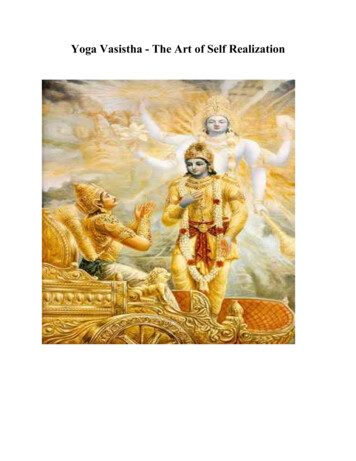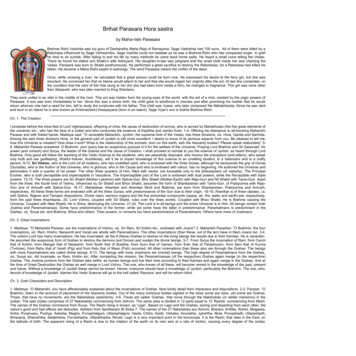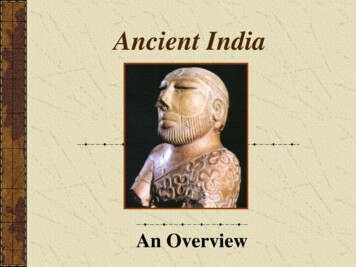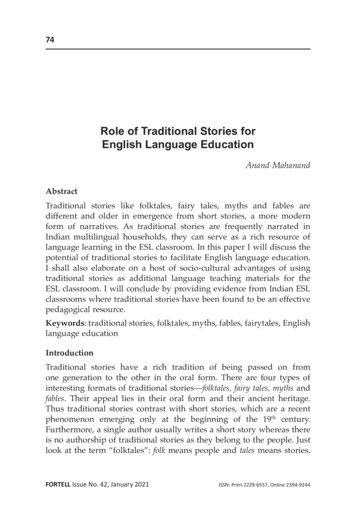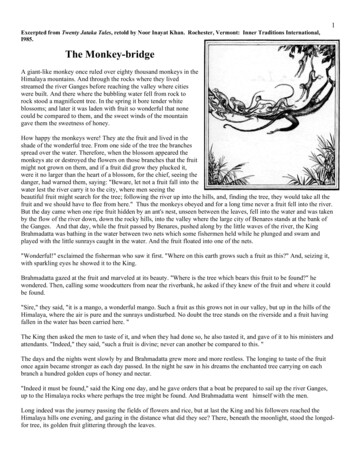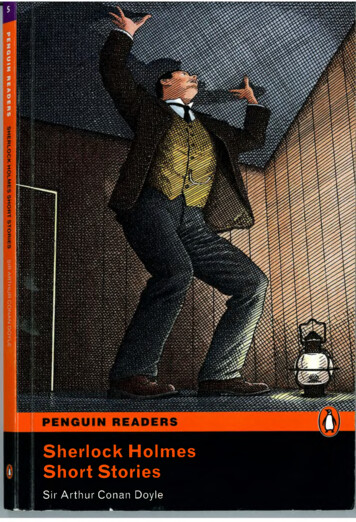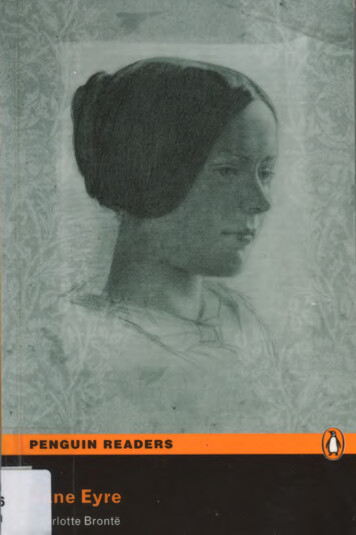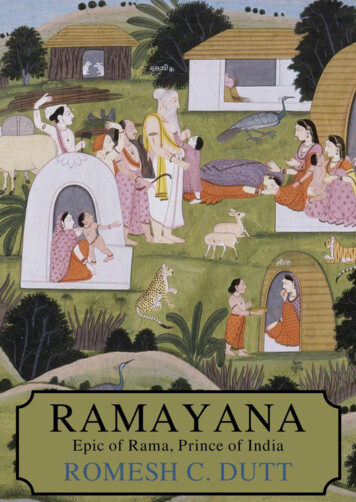
Transcription
RAMAYANA retold by C. Rajagopalachari(Edited by Jay Mazo, American Gita Society)Contents1. The Conception2. Sage Viswamitra3. Trisanku4. Rama Leaves Home5. Rama Slays The Monsters6. Sita7. Bhagiratha And The Story OfGanga8. Ahalya9. Rama Wins Sita's Hand10. Parasurama's Discomfiture11. Festive Preparations12. Manthara's Evil Counsel13. Kaikeyi Succumbs14. Wife Or Demon?15. Behold A Wonder!16. Storm And Calm17. Sita's Resolve18. To The Forest19. Alone By Themselves20. Chitrakuta21. A Mother's Grief22. Idle Sport And Terrible Result23. Last Moments24. Bharata Arrives25. Intrigue wasted26. Bharata Suspected27. The Brothers Meet28. Bharata Becomes Rama's Deputy29. Viradha's End30. Ten Years Pass31. The Surpanakha Episode32. Kamban's Surpanakha33. Khara And His Army Liquidated34. The Path Of Ruin35. The Golden Stag36. The Good Bird Jatayu37. Closely Guarded38. Rama Disconsolate39. A Second Father Dies40. Left Eyelids Throb41. He Sees Her Jewels42. Sugriva's Doubts Cleared43. The Slaying Of Vali44. Tara's Grief45. Anger And Reconciliation46. The Search Begins47. Son Of Vayu48. The Search In Lanka49. Sita In The Asoka Park50. Ravana's Solicitation51. First Among The Astute52. Sita Comforted53. Sita And Hanuman54. Inviting Battle55. The Terrible Envoy56. Hanuman Bound57. Lanka In Flames58. A Carnival59. The Tidings Conveyed60. The Army Moves Forward61. Anxiety In Lanka62. Ravana Calls A Council Again63. Vibhishana64. The Vanara's Doubt65. Doctrine Of Surrender And Grace66. The Great Causeway67. The Battle Begins68. Sita's Joy69. Serpent Darts70. Ravana's Defeat71. The Giant Is Roused72. Is This Narayana Himself?73. The Death Of Indrajit74. End Of Ravana75. The End76. Epilogue
AUTHOR'S PREFACEThe Bharatiya Vidya Bhavan hasadded to the debt of gratitude owed it byundertaking the publication of the Englishversion of my Tamil Ramayana. Theyachieved great success in the distributionof my Mahabharata book and I trust thisbook of the story of Rama and Sita willreceive similar welcome.Once again, I repeat my confession thatin the evening of my busy life during agreat and eventful period of Indianhistory, the writing of these two bookswherein I have retold the Mahabharataand Ramayana, is, in my opinion, the bestservice I have rendered to my people.At any rate, they embody the best joy Ihave experienced; for in these two books Ihelped our great sages to speak to our dearmen and women again in their ownlanguage, elevating their minds throughthe sorrows borne by Kunti, Kausalya,Draupadi and Sita. The real need of thehour is a recommunion between us andthe sages of our land, so that the futuremay be built on rock and not on sand.In presenting this English version to awider circle of readers spread all over theworld, I think I am presenting to them thepeople of Bharat just as they are, with alltheir virtues and their faults. Our classicsreally embody our national character in allits aspects and it is well the world sees usas we really are, apart from what we wishto become.The Ramayana is not history orbiography. It is a part of Hindumythology. One cannot understand Hindudharma unless one knows Rama and Sita,Bharata,Lakshmana,Ravana,Kumbhakarna and Hanuman. Mythologycannot be dispensed with. Philosophyalone or rituals alone or mythology alonecannot be sufficient. These are the threestands of all ancient religions. The attitudetowards things spiritual which belongs toa particular people cannot be grasped orpreserved or conveyed unless we have allthese three.The Bharatiya Vidya Bhavan hasachieved great work by the very widedistribution organised by it of myRamayana and Mahabharata books, whichseek to bring Valmiki and Vyasa near tothose who have no access to the unrivalledoriginal classics. The characters andincidents of these two itihasas have cometo be the raw material for the works ofnumerous poets and saints that came laterto write dramas and sing poems andhymns to keep this nation in the straightpath.Oral discourses have further playedwith them in order to entertain andinstruct pious audiences and not a fewvariations and additions have beenmade to the original. All the languagesof India have the Ramayana andMahabharata retold by their poets, withadditions and variations of their own.They are the records of the mind andspirit of our forefathers who cared forthe good, ever so much more than forthe pleasant and who saw more of themystery of life than we can do in ourinterminable pursuit for petty andillusory achievements ill the materialplane.We should be thankful to those whopreserved for us these many centuries-oldepics in spite of all the vicissitudesthrough which our nation passed sinceVyasa and Valmiki's time. Even the poetswho wrote these epics in the original didnot create but built out of the inheritedbricks of national memory prior to theirown time. Reading the Ramayana andMahabharata even in the form I havegiven them, we go back to live with ourancient forbears and listen to their grandvoice.
Mythology is an integral part ofreligion. It is as necessary for religion andnational culture as the skin and theskeleton that preserve a fruit with its juiceand its taste. Form is no less essential thansubstance. Mythology and holy figures arenecessary for any great culture to rest onits stable spiritual foundation and functionas a life-giving inspiration and guide.Let us keep ever in our minds the factthat it is the Ramayana and theMahabharata that bind our vast numberstogether as one people, despite caste,space and language that seemingly dividethem.1. THE CONCEPTIONTo the north of the Ganga was the greatkingdom Kosala, made fertile by the riverSarayu. Its capital was Ayodhya, built byManu, the famous ruler of the Solardynasty. From Valmiki's description ofthe capital Kosala, it is clear that ancientAyodhya was not inferior to our moderncities. Even in ancient India citycivilisation had reached a high level.King Dasaratha ruled the kingdomfrom the capital city of Ayodhya. He hadfought on the side of the Devas, and hisfame spread in the three worlds. He wasthe equal of Indra and Kubera. The peopleof Kosala were happy, contented andvirtuous. The land was protected by amighty army, and no enemy could comeanywhere nearIt contained forts with moats aroundthem as well as many defensiveintallations, and true to its name, Ayodhyadefied all enemies. (Ayodhya means thatwhich cannot be subdued by war).Dasaratha had eight wise ministers, everready to advise him and execute hisorders. Great sages like Vasishtha andVamadeva and other Brahmanas taughtthe dharma and performed rituals andsacrifices.Taxes were light and punishment ofcrime was just and inflicted according tothecapacityofthewrong-doer.Surrounded by the best counsellors andstatesmen, the king's splendor shone as therising sun. Many years rolled smoothlyby. In the midst of all this prosperityDasaratha had one regret; he had no son.One day in early summer he thought ofperforming a horse sacrifice for progeny.He consulted his religious masters and ontheir advice, got sage Rishyasringa toperform the Yaga. The Yaga was a grandaffair and the invitees included many ofthe kings of the day. It was no easy thingto perform yagas. The location anderection of the sacrificial platform had tobe attended to in detail strictly accordingto prescribed rules. There were expertswhose guidance was sought in arrangingthings.It meant the building of a new campcity, capable of accommodating tens ofthousands and providing hospitality andentertainment for the invitees whoincluded the princes and sages of the land.In short, yagas in those days weresomething like our present-day Statesponsored big scale conferences andexhibitions.When all arrangements were completethe ceremonies were set in motion strictlyas enjoined by the Shastras.Contemporaneously with the yaga inAyodhya, there was a conference of theDevas in heaven. The Devas complainedto Lord Brahma that Ravana, king of thedemons, drunk with the power acquiredby the boon granted to him by Brahma,was causing them untold misery andhardship. They represented to Brahma: "Itis beyond our capacity to subdue, conqueror kill Ravana. In the security of yourboon, he has grown wicked and insolentand ill-treats all, even women. His desireis to dethrone Indra. You are our only
refuge and it is for you to devise a methodby which Ravana can be slain and hisdespotism ended."Brahma knew that he had granted toRavana the boon prayed for by him thathe should be invulnerable and invincibleagainst Devas, Asuras, Gandharvas andother such beings. In his arrogance,Ravana did not care to ask for securityagainst mankind. As Brahma revealed thisfateful omission all the Gods rejoiced andturned to Vishnu.Absolutely surrendering themselves toHari, the Devas begged him to be born asa man and put an end to Ravana and hisatrocities. Hari agreed and assured theDevas that he would be born as four sonsof King Dasaratha who was thenperforming a sacrifice for progeny. As theghee was poured into the fire and theflames shot up to meet it, from out of theflames came a majestic figure, resplendentlike the noonday sun, holding a bowl ofgold.Calling King Dasaratha by his name,the figure said: "The Devas are pleasedwith you and are answering your prayer.Here is payasam sent by the gods for yourwives. You will be blessed with sons ifthey drink this divine beverage." With joyunbounded, Dasaratha received the bowlas he would receive a child and distributedthe payasam to his three wives, Kausalya,Sumitra and Kaikeyi.He asked Kausalya to drink a half ofthe payasam and he gave a half of whatremained to Sumitra. Half of what wasthen lift was drunk by Kaikeyi, and whatremained was given to Sumitra again.Dasaratha's wives were happy, even as abeggar suddenly coming upon buriedtreasure. And in due course all of themwere expectant mothers.2. SAGE VISWAMITRAIn course of time, Dasaratha's sonswere born Rama of Kausalya and Bharataof Kaikeyi. Sumitra gave birth to twins,Lakshmana and Satrughna. She had drunkthe divine payasam twice.In proportion to the quantity ofpayasam drunk by the respective mothers,the sons are traditionally considered to beparts of Vishnu. Rama was thus halfVishnu.But such calculations have no meaning,as it is impossible to measure the Infinitearithmetically. Sruit tells us that even afraction of the Supreme Being is wholeand complete by itself."OmPoornamadahPoornamidamPoornat Poornamudachyate PoornasyaPoornamadaya Poornamevavasishyate.""What is whole, this is whole; what hascome out of the whole is also whole.When the whole is taken out of the whole,the whole still remains whole."Dasaratha's four sons were given all thetraining prescribed for princes. Rama andLakshmana were specially devoted toeach other and so were Bharata andSatrughna. We can imagine that thisspecial attachment arose out of the waythe divine payasam was divided amongthe King's wives. Dasaratha was happy tosee his four sons grow up strong, virtuous,brave and lovable and with all otherprincely qualities.OnedayastheKingwascontemplating his sons' matrimony, ushersrushed in to announce that the great SageViswamitra had arrived to see him.Viswamitra was held in awe by all as themost powerful among rishis.Viswamitra's arrival at Ayodhya wasunexpected; and King Dasaratha steppeddown from his throne and advanced a fewpaces respectfully to receive the sage.Viswamitra was a king who attainedsainthood through terrible austerities. Hehad long ago exhibited his spiritualpowers by starting to create anotherBrahma and a rival universe. He had gone
as far as the creation of newconstellations, but was prevailed upon tostop by the entreaties of the alarmed gods.Viswamitra, while he was king oncewent out with his army and chanced tovisit Vasishtha's ashrama. The rishicordially welcomed his royal guest andhis huge entourage and extended to themall hospitality so sumptuous that the Kingwondered where all the rich abundancecame from in a forest hermitage.Questioned by him, Vasishtha calledhis cow Sabala and explained that she wasthe fountain of unfailing plenty.Expressing gratitude to the sage, KingViswamitra said: "You must give me thiscow as she would be more useful with methan with you. Such things of power andwealth by right belong to the King."Now Vasishtha could not part with thedivine cow. He gave many reasons andasked the King not to press his request.But the more unwilling Vasishtha was togive the cow, the more eager the Kingbecame to possess her.Failing in his efforts to tempt orpersuade the sage to part with the cow,Viswamitra became angry and ordered hismen to seize the cow by force.Sabala could not understand why shewas being roughly handled and she wasunwilling to go away from the sage andhis ashrama. Shedding tears, shewondered how she had offendedVasishtha that he should stand by andlook on while she was being draggedaway. The cow easily put to flight thesoldiers and sought refuge at the feet ofthe sage.Moved by the piteous appeal of hisbeloved cow, who was like a youngersister to him, the sage said: "Bring forthsoldiers to resist Viswamitra's men."Sabala instantaneously did so, and theaggressors were soon worsted. Wild withrage, Viswamitra got into his chariot and,taking up his bow, rained arrows on thesoldiers brought forth by the cow, buttheir strength was inexhaustible, and theroyal forces suffered utter defeat. Thesons of Viswamitra now chose Vasishthahimself as their target, only to be reducedto ashes.Defeated and disgraced, Viswamitrathen and there entrusted his kingdom toone of his sons and proceeded to theHimalayas to perform tapas, directing hisdevotions to Lord Siva to gain power withwhich to subdue Vasishtha.So firm and steadfast was Viswamitrain his austerities that Lord Siva waspleased and appeared before him. Heasked the king what his object was inperforming tapas.Viswamitra replied: "If you, Umapati,are satisfied with my tapas let me beblessed with divine arrows and be masterof every weapon.""So be it," said Siva, and gaveViswamitra all the weapons available tothe Devas, Gandharvas, Rishis, Yakshasand the Demons.Swelling with pride like the ocean,Viswamitra considered Vasishtha asalready vanquished. He straightway madefor the abode of the sage. Frightened atthe fearful sight of the onrushingViswamitra, Vasishtha's disciples and theanimals in his ashrama ran helter-skelter.Hit by the fire-weapon of Viswamitra,Vasishtha's ashrama was reduced tocinders.Vasishtha regretted the turn of events,but determined to end the haughtiness ofthe erstwhile king, he faced him calmlywith his Brahmadanda (holy staff) inhand.Mad with rage, Viswamitra shot at himall the divine weapons he had acquired,but they were quenched as theyapproached the rishi's staff and wereabsorbed by it.
Viswamitra had but one more weaponin his armory, and that was the mostpowerful of all, the Brahmastra. As hehurled it against Vasishtha the worldbecame wrapped in gloom as in somehuge eclipse, and the very immortalstrembled with fear. But the terrible astraitself was merged in the rishi's staff,making both it and the holy man glowwith the glory they had absorbed.Viswamitra stood dazed. Openlyaccepting defeat, he said: "Of what use isthe Kshatriya's might in arms? With but astaff in his hand, this Vasishtha hasnullified all my weapons. Lord Siva hasindeed fooled me. There is no alternativefor me but to become a Brahma Rishi likeVasishtha." So saying, he withdrew fromthe field of battle and proceeded south formore rigorous tapas.For years and years Viswamitra wentthrough terrible austerities. Pleased withhis perseverance, Brahma presentedhimself before him. Advising Viswamitrathat, as a result of his tapas he had risen tothe position of a rishi among kings,Brahma vanished from the scene.Viswamitra was disappointed that allhis penance could get him only the statusof Raja Rishi. Not content with anythingbut the highest the rank of a BrahmaRishi, he subjected him self to still morerigorous austerities in order that he mightbe acknowledged an equal of Vasishtha.3. TRISANKUThat was the time when the famousking of the Solar dynasty, Trisanku, wasreigning, who was so much in love withthe beauty of his body that he could notbear the thought of parting with it at deathand desired to ascend to heaven in thatvery body.Vasishtha, his preceptor, whom heapproached for help in realising his wish,advised him to give up attempting theimpossible. Dissatisfied with Vasishtha'sresponse, the King approached the sage'ssons and sought their help. They werewroth at being asked to do somethingwhich their father had pronouncedimpossible, ridiculed his vanity and curtlybade him begone.King Trisanku would not give up hisaim and told them that, since they andtheir father were too poor in merit to helphim, he would find others who werericher. Vasishtha's sons were provokedbeyond endurance, and said: "Be you achandala."The curse began to act and the nextmorning Trisanku woke up a differentperson altogether, an untouchable, ugly ofform, attired in dirty clothes.His ministers and his people could notrecognise him. Driven out of his kingdomhe wandered hungry and weary almost todeath, till his destiny took him toViswamitra's ashrama.The king's appearance moved the heartof the sage, who enquired: "Aren't youKing Trisanku? What has brought you tothis plight? Whose curse?"Recounting all that had happened hefell at the sage's feet and said: "I havebeen a good king and never swerved fromthe path of dharma. I have committed nosin and wronged none. My preceptor andhis sons have deserted me and cursed meand you see me thus before you."Viswamitra took pity on the Kingconverted by a curse into a chandala. Thiswas Viswamitra's great weakness; he wasimpulsive and easily over-powered byemotions like anger, sympathy and love.In sweet words, he made the kinghappy: "O, King, I have heard of yourrighteous rule. I offer you refuge; be notafraid. I will arrange for the sacrificewhich will enable you to enter heaven inyour own body. And in this very chandalaform you shall reach heaven despite yourGuru's curse. Of this you may be sure."
And he made arrangements for a greatand unprecedented yaga.Viswamitra directed his disciples toinvite all the sages and, their disciples forthe proposed yaga. Afraid of saying "No"to what was more or less a command, allthe rishis agreed to be present.But the sons of Vasishtha declined theinvitation and made merry about a yaga atwhich the officiating priest was a onceupon-a-time Kshatriya and the yajaman astinking chandala.This reply, duly conveyed, enragedViswamitra who exploded into a cursethat Vasishtha's sons do die and be rebornfor seven generations in a tribe given toeating dog's flesh.The sage then began the yaga.Extolling Trisanku's eminent virtues,Viswamitra sought the help of the otherrishis in effecting the bodily translation ofTrisanku to heaven.Well aware of the sage's mightypowers and fulminous temper, the inviteeslent their support, and the yaga went on. Itreached the stage when the gods wereinvoked to descend and accept theofferings. But no god came. It was clearthat Viswamitra's yaga was a failure. Andthe rishis, who had attended theceremony, laughed within themselves atViswamitra's discomfiture.Wild with rage, Viswamitra held theladle of ghee over the flames and said: "OTrisanku, here behold my power. I nowtransfer for your benefit all the merit Ihave earned. If my austerities have anyvalue, they should lift you to heaven inyour physical frame. I care not if theDevas reject my offerings. King tofthoseassembled,Trisanku in his chandala body roseheavenward. The world saw the power ofViswamitra's tapas.Trisanku reached Swarga. But Indraforthwith pushed him down saying, "Whoare you, entering heaven with a chandalabody? You fool that earned the curse ofyour preceptor, go down again."Trisanku fell from heaven, head downwards, screaming, "Viswamitra! Saveme!"Viswamitra, seeing this, was besidehimself with rage. Determined to teach thegods a lesson, he shouted to Trisanku."Stop there! Stop there!" and, to theamazement of all, Trisanku's earthwarddescent came to an abrupt stop and hestopped in mid air, shining like a star.Like a second Brahma, Viswamitraproceeded to create a new starry horizonto the south as well as a new Indra andnew Devas.Alarmed at their supremacy, the Devasnow came to terms and humbly entreatedViswamitra to desist. They said: "LetTrisanku stay where he is at present. Letthe other stars, of your creation shineforever, like your own fame and honor.Control your anger and be friends withus."Gratified at this submission, and aseasily appeased as provoked, Viswamitrabaited his creative process. But hisstupendous activities had consumed thewhole of the power that he had thus faracquired by his austerities, and he foundhe had to begin again.Viswamitra now proceeded westwardsto Pushkara and resumed his austerities.For years the rigorous tapas continued, butonce again as it was about to bear fruitsomething happened to rouse his angerand he lost his balance and cursed his ownsons. Soon recovering himself, he firmlyresolved never again to yield to anger, andresumed his tapasAfter many years of austerities,Brahma and the Devas appeared beforehim and said: "O Kausika! Your tapas has
borne fruit. You are no longer in the ranksof kings; you have become a real rishi."Having thus blessed Viswamitra, Brahmareturned.This was again a disappointment. Hewanted to become a Brahma Rishi andVasishtha's peer and he had only beenacknowedged an ordinary rishi. It wasrecognition as futile as the missiles ofpower, which Vasishtha's Brahmadandahad swallowed.He therefore decided to go on with histapas, making it more severe than everbefore.The Devas did not like this. They sentthe heavenly damsel Menaka to tempt himwith her celestial beauty and allurements.She went to Pushkara where Viswamitrawas undergoing austerities and played, tocatch his eye with a hundred wiles ofcharm and grace. Viswamitra saw her andwas fascinated by her beauty. His vowwas broken and he spent ten years in adream of ioy, forgetful of his high resolve.Awaking at last, he looked at thetrembling Menaka sorrow fully and saidhe would not curse her, for it was his ownfolly, and not her fault, as in tempting himshe was only carrying out the orders ofher master. And sadly he wended his wayto the Himalayas to resume his brokentapas.There, for a thousand years, controllinghis senses, he performed rigorous tapas.At the request of the Devas, Brahmaappeared before Viswamitra, and spoke tohim thus sweetly: " I welcome you as aMaharishi, my son. Pleased with yoursoulful tapas I confer on you that title andthe sanctity it imports."Unmoved alike by gratification ordisappointment, Viswamitra folded hishands in adoration and asked the Father ofthe Universe if the boon meant conquestover the senses."By no means", said the Creator, "butstrive to subjugate the senses, tiger amongmunis!"Resolved on the supreme conquest,Viswamitra entered on another thousandyears of even harder tapas which threwthe Devas into even greater consternation.Indra called unto him the celestialdamsel Rambha, and enjoined on her as avital service to the Devas, to employ allher art to bring Viswamitra under the spellof her charm, and divert him from hispurpose. She was sorely afraid, but Indraassured her that she would not be leftalone, but be accompanied by the God ofLove and the Spirit of Springtime wouldbe with her for support.Unwillingly she went and as sheentered the precincts of the hermitage, theforest blossomed into vernal beauty, andthe south wind blew gently laden with thescent of flowers, and kokilas burst intosong. Love and Spring were both there toassist Beauty. Disturbed by stirrings towhich he had long been a stranger,Viswamitra opened his eyes and saw asmiling damsel of surpassing beauty, whoseemed the very soul of the spring with itsflowers and fragrance and song.At this vision of soft voluptuousness awhite heat of anger surged through him ashe recognised in it another temptationthrown in his way by the envious gods,and he cursed the temptress: "O Rambha,for seeking to tempt me who am strivingto conquer anger and desire, be thoufrozen to an image of stone for tenthousand years."But this explosion of rage made himsee how far he was from the fulfilment ofhis purpose and sadly he quitted theHimalayan forests, and sought the solitudeof the east.There, he restrained his breathing, gaveup all thought of the things of the world,and performed austerities so stern that
smoke and flames issued from his bodyand enveloped the universe. Then at theprayer of the panic-stricken gods, Brahmaagain appeared before him, and hailed himas Brahma Rishi: "All hail, Brahma Rishi,I am pleased with you. Blessed be yourlife." Viswamitra was happy.But humbly he said: "How can I behappy unless from Vasishtha's lips I hearthat I am a Brahma Rishi?"Vasishtha smiled remembering hisfight with Viswamitra, and said to him:"You have achieved the fruit of your greatausterities. Indeed you are a BrahmaRishi, my brother." There was joy allround.This was the story of the sage thatarrived suddenly at Dasaratha's court.4. RAMA LEAVES HOMEKing, Dasaratha received Viswamitraas Indra would welcome Brahma andtouching his feet, the King said: "I amindeed blessed among men. Your comingcan only be due to the merit of myancestors. Like the morning sun thatdispels the darkness of night, your facebrings joy to my sight. My heart is full.Born a king, you have become throughtapas a Brahma Rishi. And you yourselfhave come seeking my dwelling. Is thereanything in my power that I can do foryou? If so, command and I shall obey."Viswamitra was rejoiced to hear thesewords of Dasaratha, and his facebrightened. He said: "O King, your wordsare worthy of you. Born in the Ikshvakuline, with Vasishtha for your Guru, whatelse could you say? You have said 'yes'before I asked. This fills my heart withjoy." And he straightway explained thepurpose of his visit.Viswamitra said: "I am engaged inperforming a sacrifice. As it nearscompletion, two powerful Rakshasas,Maricha and Subahu, defile it. Theyshower unclean blood and flesh on thesacred fire. Like other rishis we couldcurse and destroy them. But that would bea waste of all our tapas."Our troubles will end if you send withme Rama, the eldest of your warlike sons.Under my care, he will grow in princelystature. He will surely defeat theseRakshasas and his name will gather lustre.Entrust Rama to my care only for a fewdays. Do not refuse my request. Fulfil thepromise you gave me unsought. OfRama's safety you need have no anxiety.You will earn undying fame in the threeworlds. Vasishtha and your ministers willagree with what I say."Dasaratha trembled with fear andanxiety. He had a hard choice to make;either to give his well-beloved son to bekilled by the Rakshasas or himself incursthe terrible anger of Viswamitra.For a few moments, Dasaratha stoodspeechless, for he was stunned andbewildered. But recovering from theshock, he begged the sage not to press hisdemand, and said: "Rama is not yet fullysixteen years of age. How can he fightwith Rakshasas? Of what use is it to sendhim with you? What does he know of thewiles of Rakshasas? It is not right that Ishould send a mere lad to fight them, I amhere, and my army is ready to march.How can a lad protect you and your yaga?Tell me all about your foes. I shall go withyou at the head of my army and do yourbidding and serve your need. Do tell meabout these desecrators."Viswamitra described Maricha andSubahu and Ravana their master. And hedemanded again that Rama should be sentalong with him.Dasaratha persisted in refusal. "Partingfrom Rama will be death to me," he said."I shall go with you, I and my army. Why,it seems to me the task proposed is prettyhard even for me. How then can my son
cope with it? Indeed, I cannot send him. Ifyou please, I am ready with my army."Dasaratha's attempt to go back on hishasty word, enraged Viswamitra. TheKing's pleas and reasons were like oilpoured on the fire of his anger."This conduct is unworthy of yourlineage", the sage said. 'Tell me if this isyour final word. I shall go back the way Icame. Long may you live with your kithand kin, having swerved from the path ofTruth!"The earth quaked and the gods wereafraid of the possible consequences of thesage's wrath.Vasishtha now turned to the King andspoke gently: "It ill becomes you, King, torefuse having promised once. Born in theIkshvaku line, you cannot do it. Havingonce said, 'I will do', you have no optionbut to do it. Failing, you will lose themerit of all your great gifts and deeds.Send Rama with the sage, and sendLakshmana too. You need have no fearfor their safety, When they are protectedby Viswamitra, no Rakshasa can hurtthem. As the drink of the gods, shieldedby the wheel of fire, so will Rama be byViswamitra. You have no idea ofViswamitra's power; he is tapas in humanform. Bravest of the brave and wisest ofthe wise, he is master of every weapon. Inthe three worlds there is not, and therewill never be, any to equal him in martialor spiritual prowess. When he was king heobtained from the gods mastery of allweapons. He beholds the past, the presentand the future. Then why does he want theprinces, you may wonder. He can welltake care himself of his yaga; but it is forthe good of your sons that he has comehere and appears to seek your help. Do nothesitate. Send your sons with him."Listening to the wise Vasishtha,Dasaratha saw things clearly and made uphis mind to send Rama and Lakshmana.The two princes were then brought tothe presence of the sage. The King, theQueen-Mothers and Vasishtha blessedthem and sent them with Viswamitra.A pleasant breeze wafted and flowerswere strewn by the denizens of theheavens. Auspicious sounds were heard.Bow in hand, the two lads strode proudlyon either side of the Sage.Valmiki and Kamban revel in thispicture of the two handsome p
version of my Tamil Ramayana. They achieved great success in the distribution of my Mahabharata book and I trust this book of the tory of Rama and Sita wills receive similar welcome. Once again, I repeat my confession that in the evening of my busy life during a great and eventful period of Indian
